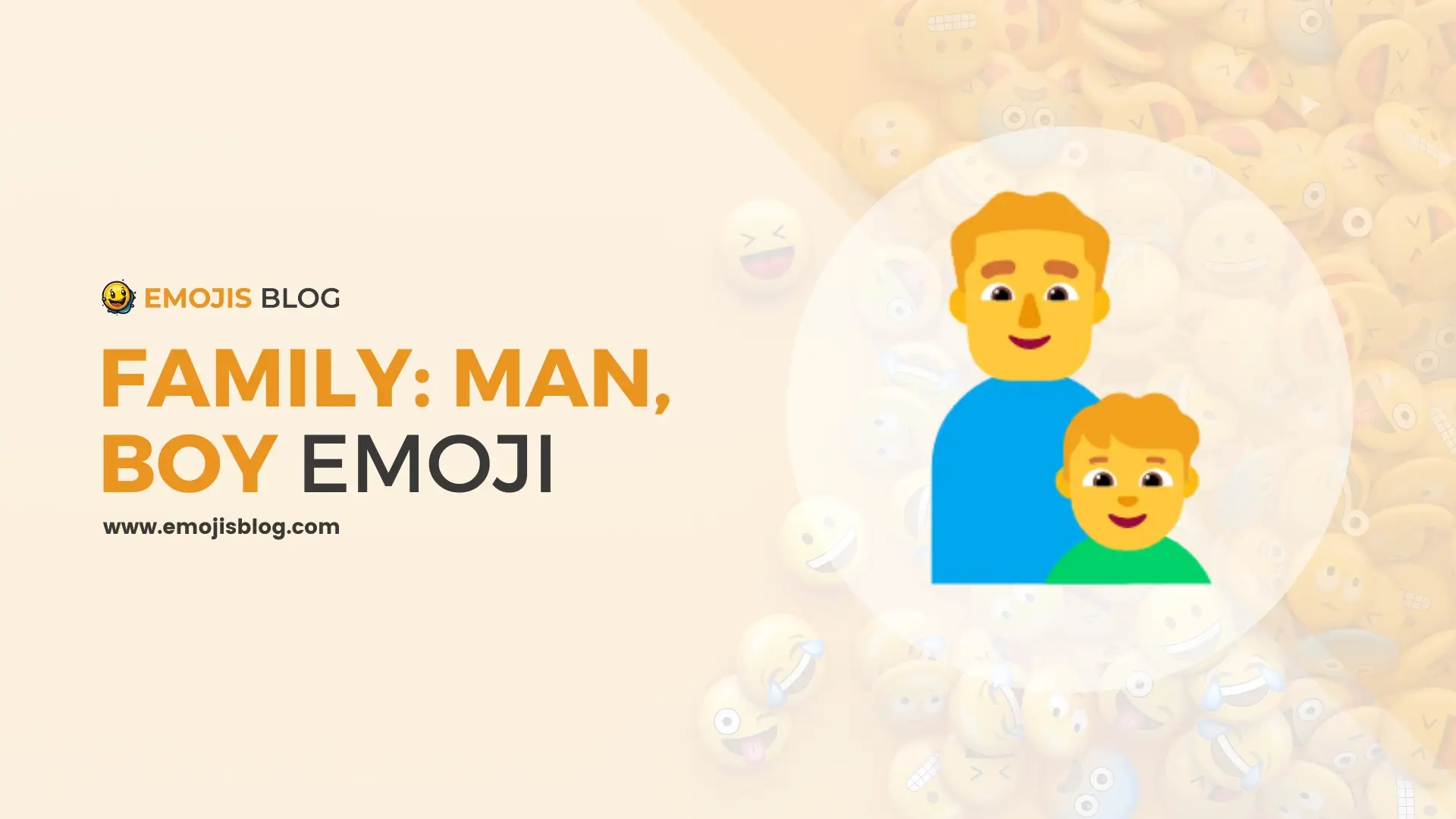What Does The Family: Man, Boy Emoji 👨👦 Mean?
👨👦
Family: Man, Boy Emoji 👨👦 Meanings
The Family: Man, Boy emoji 👨👦 depicts an adult male and a young boy standing side by side, symbolizing a father-son relationship. It represents the bond between a father and his child, often used to convey themes of familial love, care, and parental pride. While primarily illustrating a father and son, it can also be interpreted more broadly to reflect general family dynamics and parent-child interactions. This emoji, part of the broader family emoji series, underscores the importance of family connections and inclusivity in digital communication.
Technical Information
| Attribute | Information |
|---|---|
| Unicode | U+1F468 U+200D U+1F466 |
| Name | Family: Man, Boy |
| Codepoints | U+1F468 (Man) U+200D (Zero Width Joiner) U+1F466 (Boy) |
| Shortcode | :family_man_boy: |
| Introduced | Unicode 6.0 |
| Emoji Version | 1.0 |
| Category | People & Body |
| Subcategory | Family |
| Variations | Skin tones available for both characters |
| Platforms Supported | Apple, Google, Microsoft, Samsung, WhatsApp, Twitter, Facebook, etc. |
| Presentation | Typically shown as two characters standing side by side, variations in design based on platform |
| Keywords | family, father, son, man, boy, parent, child |
| Usage | Represents father-son relationship, family dynamics, parental pride |
What Does the Family: Man, Boy Emoji 👨👦 Mean?
The Family: Man, Boy emoji 👨👦 is part of the family emoji series that represents various family structures. This particular emoji depicts a family unit consisting of an adult male and a young boy, symbolizing a father-son relationship. As with all emojis, the interpretation and usage can vary depending on the context in which it is used.
Historical Background of Emojis
The Origin of Emojis
Emojis originated in Japan in the late 1990s, created by Shigetaka Kurita, who was part of the team working on NTT DoCoMo’s i-mode mobile internet platform. The initial set included 176 icons and was intended to convey information in a concise and visually appealing manner. Over the years, emojis have evolved and expanded, becoming a universal form of digital communication.
Introduction of Family Emojis
Family emojis were introduced to represent the diversity of family structures globally. Initially, there were limited options that reflected traditional nuclear families. Over time, updates have included more variations to better represent different family configurations, including single parents, same-sex parents, and multi-generational families.
Visual Representation and Design
Appearance of the Family: Man, Boy Emoji
The Family: Man, Boy emoji is depicted as two characters, an adult male and a young boy. They are shown standing side by side, usually facing forward. The design can vary slightly between different platforms (Apple, Google, Samsung, etc.), but the core concept remains consistent.
Customization and Variations
Some platforms allow customization of the emoji, enabling users to change skin tones to better represent their own families. This feature is part of a broader movement towards inclusivity and representation in digital communication.
Symbolism and Interpretation
Representation of Father-Son Relationships
Primarily, the Family: Man, Boy emoji symbolizes the bond between a father and his son. It is often used in contexts where one wants to depict familial love, care, and responsibility.
Broader Family Context
While the emoji explicitly shows a father and son, it can be used more broadly to represent families in general, highlighting the concept of parenthood and childhood.
Common Usage Scenarios
Celebrating Family Events
People commonly use the Family: Man, Boy emoji in messages and social media posts to celebrate family-oriented events such as Father’s Day, birthdays, and other milestones involving children.
Expressing Parental Pride
Parents, especially fathers, might use this emoji to express pride and affection for their sons. It can accompany messages of support, congratulations, or just everyday interactions.
Reflecting Family Dynamics
In discussions about family life, parenting, and child-rearing, this emoji helps to visually represent and add emotional context to the conversation.
Cultural and Social Impact
Promoting Family Values
The inclusion of family emojis, such as the Family: Man, Boy, in digital communication promotes family values by providing a simple yet powerful way to visually express familial bonds.
Inclusivity and Representation
By offering diverse family configurations, these emojis help to foster a sense of inclusivity, acknowledging that families come in many forms. This representation is crucial in creating a more accepting and understanding digital environment.
Conclusion
The Family: Man, Boy emoji 👨👦 is a versatile and meaningful symbol in the digital communication landscape. It highlights the bond between fathers and sons while also representing the broader concept of family. As emojis continue to evolve, they play a crucial role in expressing human emotions and relationships in an increasingly digital world. Through the use of this emoji, individuals can convey love, pride, and the importance of family in a visually engaging and universally understood manner.

